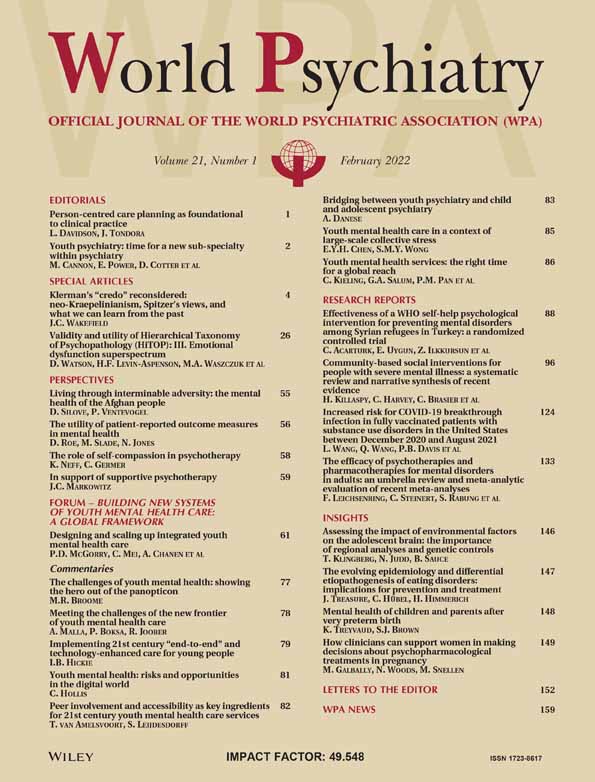老年人精神卫生保健:临床实践和研究的最新进展和新方向。
IF 73.3
1区 医学
Q1 Medicine
引用次数: 32
摘要
世界人口正在老龄化,这给老年人带来了更大的精神障碍负担。鉴于多病性,这些人及其家庭照护者的精神卫生保健是劳动密集型的。与此同时,年龄歧视对老年人来说是一个大问题,无论他们是否患有精神障碍。老龄化的积极因素,如复原力、智慧和亲社会行为,需要得到强调和促进,以打击耻辱,并帮助保护和改善老年人的心理健康。老龄化的积极精神病学并不是一种矛盾修饰法,而是一种由研究证据强有力地支持的科学建构。我们支持一个更广泛的老年精神病学概念——一个包括健康和疾病的概念。在本文中,我们在四种疾病的背景下解决这些问题,这些疾病是残疾生活年的最大来源:神经认知障碍,重度抑郁症,精神分裂症和物质使用障碍。我们强调有必要实施多学科团队护理,包括全面评估、临床管理、密集外联和协调精神、身体和社会健康服务。我们还强调需要进一步研究治疗反应变异性的调节因子和中介因子。由于老年精神障碍患者的最佳护理既以患者为中心又以家庭为中心,因此我们呼吁进一步研究如何提高家庭照顾者的福祉。为了优化药物治疗的安全性和有效性,需要进一步关注代谢、心血管和神经耐受性,同时进一步开发和测试降低自杀风险的药物。与此同时,我们也讨论了积极衰老和正常认知衰老,这既是对年龄歧视的解药,也是改变我们对衰老本身以及更具体地说,晚年精神障碍的看法的催化剂。正是在这样的背景下,我们为今后的临床护理和研究提供了方向。本文章由计算机程序翻译,如有差异,请以英文原文为准。
Mental health care for older adults: recent advances and new directions in clinical practice and research.
The world's population is aging, bringing about an ever‐greater burden of mental disorders in older adults. Given multimorbidities, the mental health care of these people and their family caregivers is labor‐intensive. At the same time, ageism is a big problem for older people, with and without mental disorders. Positive elements of aging, such as resilience, wisdom and prosocial behaviors, need to be highlighted and promoted, both to combat stigma and to help protect and improve mental health in older adults. The positive psychiatry of aging is not an oxymoron, but a scientific construct strongly informed by research evidence. We champion a broader concept of geriatric psychiatry – one that encompasses health as well as illness. In the present paper, we address these issues in the context of four disorders that are the greatest source of years lived with disability: neurocognitive disorders, major depression, schizophrenia, and substance use disorders. We emphasize the need for implementation of multidisciplinary team care, with comprehensive assessment, clinical management, intensive outreach, and coordination of mental, physical and social health services. We also underscore the need for further research into moderators and mediators of treatment response variability. Because optimal care of older adults with mental disorders is both patient‐focused and family‐centered, we call for further research into enhancing the well‐being of family caregivers. To optimize both the safety and efficacy of pharmacotherapy, further attention to metabolic, cardiovascular and neurological tolerability is much needed, together with further development and testing of medications that reduce the risk for suicide. At the same time, we also address positive aging and normal cognitive aging, both as an antidote to ageism and as a catalyst for change in the way we think about aging per se and late‐life mental disorders more specifically. It is in this context that we provide directions for future clinical care and research.
求助全文
通过发布文献求助,成功后即可免费获取论文全文。
去求助
来源期刊

World Psychiatry
Nursing-Psychiatric Mental Health
CiteScore
64.10
自引率
7.40%
发文量
124
期刊介绍:
World Psychiatry is the official journal of the World Psychiatric Association. It aims to disseminate information on significant clinical, service, and research developments in the mental health field.
World Psychiatry is published three times per year and is sent free of charge to psychiatrists.The recipient psychiatrists' names and addresses are provided by WPA member societies and sections.The language used in the journal is designed to be understandable by the majority of mental health professionals worldwide.
 求助内容:
求助内容: 应助结果提醒方式:
应助结果提醒方式:


